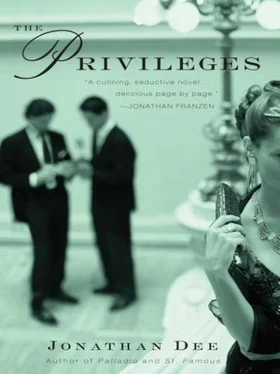“Gotta go,” he says. “The hookers are here.”
She hangs up on him, smiling. In the living room, Marietta stands uncomfortably, while Deborah, back on the couch, watches her like a guard dog, like some emissary from the underworld of the socially damned. Marietta can read her hatred only as jealousy, which softens her own attitude a bit.
“So,” she says, and remembers that Deborah is a graduate student somewhere, in something. “School is good?”
Adam strolls into the hotel dining room and sees that his parents, sitting with a stricken-looking Conrad, have ordered their breakfast but not touched it. They missed their connection in New York yesterday and arrived too late to make it to the rehearsal dinner, which may have been just as well. He kisses his mother on the top of her head. “How’s your room?” he asks. “Everything to your liking?”
Adam’s father makes a sarcastic noise, which his mother recognizes and preemptively talks over. “Very nice,” she says. “Very comfortable. You have to point out Cynthia’s parents to me so we can say thank you.”
The two sets of parents have never met. There didn’t seem much point to it. “Marietta made it home okay last night?” Adam asks Conrad. Conrad nods but does not stop eating, because he would very much like to get this breakfast over with. Adam signals the waitress for coffee. He hasn’t really looked at either of his parents since he sat down. No one is looking at Mr. Morey, though he seems to be mysteriously gathering himself nonetheless, like a clock about to strike. Two heart attacks have hunched his shoulders in the way of a man much older than he actually is. Up in the room are four portable oxygen tanks, in case he needs them, and in the purse at his wife’s feet are various pills and phone numbers. But his short temper and unregulated resentments suggest that his physical failings are a kind of natural outgrowth of his personality, and everyone who knows him, mindful of his angry pride, is unsolicitous toward him. He is tormented by the efflorescence of foolishness and waste of all kinds, everywhere around him. He was a pipe fitter who became a full-time union executive until his disabilities forced him to retire. The Pittsburgh Athletic Club is exactly the kind of place that sets him off. His wife has made him put on a coat and tie for breakfast even though she will now have to hear about it for the next month.
But Adam is not embarrassed by them in this setting, as his brother is, because he doesn’t really associate them all that closely with himself anymore. He is amused by their helpless compulsion to be themselves, and will wind them up like a music box at any opportunity. “Hey, you know what I found in my room?” he says. “In the dresser drawer? A list of room rates. Did you guys see that? Do you have any idea what this place costs?”
“Oh, Adam, please,” his mother whispers, “today of all—”
“As it happens, I did,” his father says, reddening. “I’m just glad I’m not the sap paying for all this.”
“More reason to be glad we never had girls,” his mother says, and laughs as if she were being filmed laughing.
“That wouldn’t have made a damn bit of difference to me,” Mr. Morey says. “I don’t have to put on a show for anybody. I don’t pretend to be anything I’m not.”
Adam abruptly stands up. “Oh look, there’s Mr. Sikes,” he says. “Excuse me. I’m gonna go practice calling him Dad.” And he crosses the room to where the bride’s dapper father sits at a table by himself, reading the paper. Conrad watches him leave in disbelief. His parents stare accusingly at each other. A moment later the waitress comes by and fills Adam’s coffee cup.
The doors to the hotel ballroom are shut, and behind them, in moments of silence, one can hear the vacuum cleaners run. Teenage girls in stiff black skirts walk from table to table, checking the place settings, counting on their fingers. They work slowly; the air conditioning is turned up all the way, and with the room not yet full of bodies it is exotically cold, the coldest place in the hotel. Only those most desperate for a cigarette pass through the double doors to the infernal kitchen and the steaming alley beyond.
At the hotel bar sits the wedding planner, habitually early, having sent her son and his friend to the florist’s in her van, praying they haven’t stopped to get high along the way. It’s why she doesn’t pay them in advance. The bar isn’t officially open yet but Masha knows everyone at the Athletic Club; this will be her fourth reception there this year. Though it’s before noon, she feels like (as her father used to say) a drink drink, and Omar the bartender would certainly comp her one, but while she’s on the job alcohol is out of the question. Something like that gets out and your reputation is shot. True, the bride — whose superior attitude Masha doesn’t especially care for — isn’t even from Pittsburgh and acts as if she might never set foot here again after today; but the stepfather, whose name is on the checks, is some rainmaker at Reed Smith, and the mother, whose superior attitude she doesn’t much care for either, is one of those chronically unsatisfied types who love nothing better than to nurse along some scandal, substantiated or otherwise.
But that’s the secret to Masha’s success: you get invested not in the people, who can let you down, but in the ceremony, which never does. She doesn’t say it out loud very often but she thinks of herself as a guardian of something, a finger in the dike holding back total indifference toward the few things that have always mattered, ritual and devotion and commitment. When you thought of it that way, the less you happened to care for the families themselves, the more noble your work became. Her own marriage ended after nine years, but that detracted in no way from the beautiful memory of her wedding day itself; in fact, that’s what you were left with, she thinks, that and a beloved if somewhat less than reliable son. Besides, if it were up to her they would all still be together, husband and wife and child, through happy and contentious times alike. But not everything is her decision.
A couple around the bride and groom’s age walks into the bar and Omar tells them that he’s closed. The boy looks ready to argue the evidence, but the girl says, “Forget it. I need to go upstairs and take another shower anyway.” That’s what today’s going to be, Masha thinks: a pageant of sweat. Eighty-eight already, according to the silent TV screen above Omar’s shaved head. That was part of the risk they all assumed when they booked the most beautiful old unmodernized Catholic church in Pittsburgh. That’s why she is waiting until the last moment with the flowers. She couldn’t book them the weather. Not that that would stop the mother from blaming her for it anyway.
Across town Cynthia and Marietta sit bemused and intimidated, shirtless, their heads poking through holes cut in old bedsheets, as a tight-lipped Polish woman (recommended by Masha) and her young assistant do their hair. They tease each other with stories from their college days; all the stories involve embarrassment or regret but none of them can’t be laughed at. Only a few of them are about men because Cynthia and Adam started dating sophomore year. The Polish women, in a kind of secondary theme, speak in unsmiling Polish about God knows what, at least until Cynthia says something about how badly this whole ordeal makes her want a cigarette.
“Please no,” the older one says, her scissors in the air. “Big kiss on altar, your husband think hey, my wife’s head smell like fucking ashtray.”
Their eyes meet in the mirror, already retelling it.
The doors to the church stand open, for circulation’s sake, but the dust hangs motionless on the ramps of light that slope down from the tall windows. Masha watches her red-eyed son and his Mexican friend, whom she secretly calls Señor Detention, try to get the white runner straight atop the sun-bleached carpeting between the pews. She pulls a creased checklist out of her jacket pocket and walks past the kneeling boys to the pulpit; turning to face the rows of empty seats, she solemnly taps her finger on the live microphone.
Читать дальше












